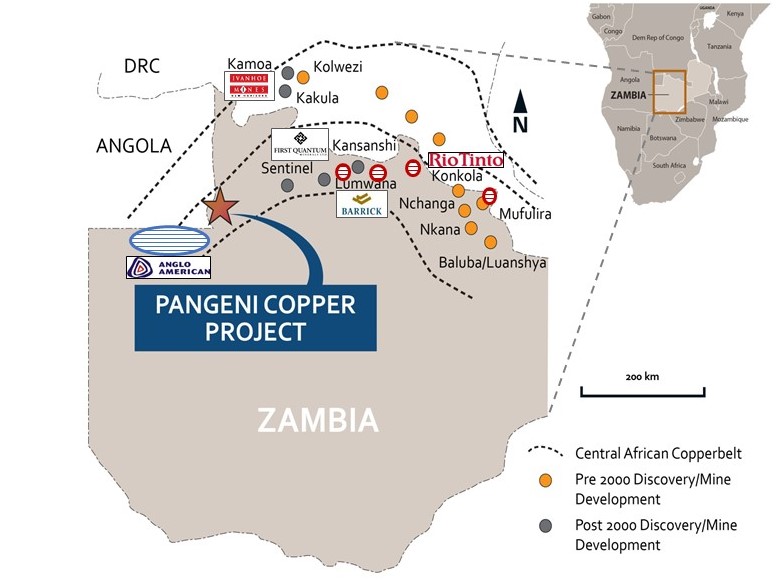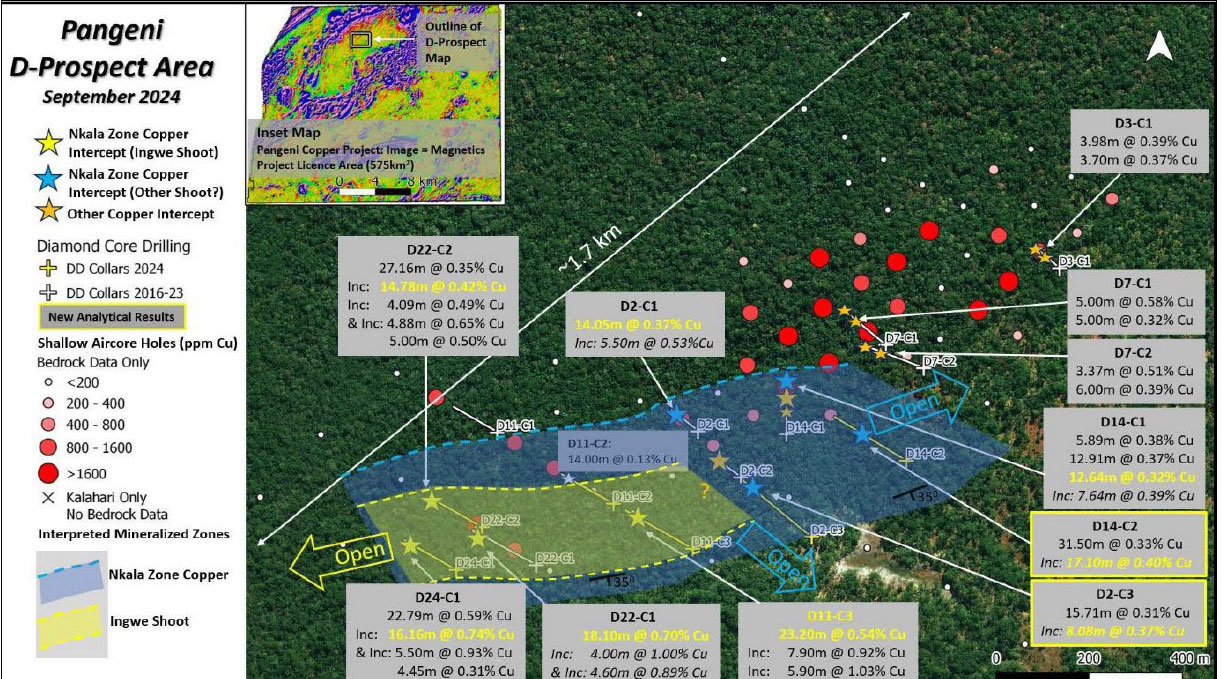Background on Pangeni Project (The Next Lumwana Copper Mine?)
The Pangeni Copper Project (“Pangeni”, the “Project” or the “Property”) is located along the western extension of the Central African Copperbelt in Zambia (the “Copperbelt”). The Central African Copperbelt is one of the largest copper producing regions in the world. The Copperbelt hosts numerous world-class copper mines such as Barrick Gold’s Lumwana Mine and First Quantum Mineral’s Sentinel Mine. The Copperbelt is also active with large-scale exploration programs by major mining companies such as Anglo American and Rio Tinto, and more recently by Kobold Metals, which is a new AI exploration company backed by Bill Gates and Jeff Bezos.
The extensive Kalahari sand cover in this region of Zambia previously prevented meaningful historical exploration. Now, using modern exploration techniques this has created a compelling opportunity for our discovery of tier one scale copper deposits under the relatively thin sand cover at the Pangeni Project.
Pangeni Project Location Map
Since 2018, BeMetals has conducted very cost-efficient exploration programs, largely consisting of shallow aircore drilling to detect initial traces of copper below the sand cover and then using conventional diamond drilling to retrieve core samples at priority exploration targets such as the D-Prospect. Thus far, the D-Prospect has returned results that are comparable to the Lumwana Mine in terms of similar grades, widths, and mineralogy. (See the figure below for location of D-Prospect and drill hole intersections across the area)
Pangeni Project: D-Prospect Core and Aircore Drilling Intersections
In March 2021, BeMetals entered into a joint venture agreement with the Japan Organization for Metal and Energy Security Corporation (“JOGMEC”) to expand and accelerate exploration activities at the Pangeni Property. JOGMEC is a Japanese government agency that operates internationally to secure natural resources for Japan. To date, JOGMEC has contributed some C$4 million towards money-in-the-ground focused exploration expenditures at the Property.
Over the past six years, BeMetals has completed several phases of aircore and core drilling at the Property and during the first half of 2024, the Company completed its most successful phase of drilling to date. The Company reported analytical results for a six-hole core drilling program designed to identify zones of higher grades and extend zones of discovered copper mineralization at the D-Prospect. These drill intersections meet or exceed the widths and grades of deposits like some of the large-scale copper mines and projects within the Domes Region of the prolific Copperbelt. The mineralization remains open along strike in both the SW and NE directions as well as down dip to the SE with additional exploration targets in close proximity to the D-Prospect.
The Pangeni Project continues to deliver compelling results, indicating significant scale to the mineralization, and with ongoing drilling success, the potential for the discovery of a tier one copper deposit beneath the Kalahari sand cover. Drilling will continue from Q3 2024 and carry on from Q1 2024.
See the table below for the latest drill hole intersection highlights at the D-Prospect.
Table: Highlight Drill Intercepts at D-Prospect Area
| D-Prospect, Borehole ID & Interval | From (m) | To (m) | Core Interval (m) | Cu % | Co ppm |
| D24-C1: Interval 1 | 302.21 | 325.00 | 22.79 | 0.59 | 423.00 |
| Including (Nkala Zone) | 302.21 | 318.37 | 16.16 | 0.74 | 533.00 |
| including | 312.00 | 317.50 | 5.50 | 0.93 | 701.00 |
| Interval 2 | 320.55 | 325.00 | 4.45* | 0.31 | 163.00 |
| D22-C1: Interval 1 | 105.81 | 109.19 | 3.35 | 0.44 | |
| Interval 2 | 237.95 | 242.00 | 4.05 | 0.40 | |
| Interval 3 | 260.00 | 278.10 | 18.10 | 0.70 | |
| including | 260.00 | 264.00 | 4.00 | 1.04 | |
| also including | 272.00 | 276.60 | 4.60 | 0.89 | |
| Interval 4 | 284.50 | 288.34 | 3.84 | 0.48 | |
| D22-C2 | 181.70 | 183.70 | 2.00 | 0.37 | 78.00 |
| Interval | 200.00 | 227.16 | 27.16* | 0.35 | 51.00 |
| Interval (Nkala Zone) | 200.00 | 214.78 | 14.78 | 0.42 | 62.00 |
| including | 200.00 | 204.09 | 4.09 | 0.49 | 64.00 |
| also Including | 208.03 | 212.91 | 4.88 | 0.65 | 63.00 |
| also Including | 211.86 | 212.91 | 1.05 | 1.62 | 76.00 |
| Interval | 222.16 | 227.16 | 5.00 | 0.50 | 51.00 |
| including | 222.16 | 223.16 | 1.00 | 1.71 | 84.00 |
| D11-C3 | |||||
| Interval (Nkala Zone) | 275.80 | 299.00 | 23.20 | 0.54 | 263.00 |
| Including | 275.80 | 283.70 | 7.90 | 0.92 | 453.00 |
| Including | 275.80 | 281.70 | 5.90 | 1.03 | 507.00 |
| D2-C3 | 235.00 | 240.73 | 5.73 | 0.31 | 120.00 |
| Interval (Nkala Zone) | 321.20 | 336.91 | 15.71 | 0.31 | 202.00 |
| Including | 321.20 | 325.30 | 4.10 | 0.38 | 192.00 |
| Also including (Nkala Zone) | 328.83 | 336.91 | 8.08 | 0.37 | 209.00 |
| And including | 332.00 | 336.91 | 4.91 | 0.46 | 226.00 |
| D2-C1 | 182.95 | 197.00 | 14.05 | 0.37 | |
| Including | 191.50 | 197.00 | 5.50 | 0.53 | |
| D14-C2 | 211.50 | 243.00 | 31.50* | 0.33 | 154.00 |
| Including (Nkala Zone) | 221.00 | 238.10 | 17.10 | 0.40 | 184.00 |
| 255.20 | 258.90 | 3.70 | 0.72 | 461.00 | |
| 273.07 | 276.18 | 3.11 | 0.49 | 210.00 | |
| D14-C1: Interval 1 | 80.47 | 149.88 | 69.41* | 0.25 | |
| Including: | 91.34 | 94.84 | 3.50 | 0.35 | |
| Also including: | 102.62 | 107.37 | 4.75 | 0.45 | |
| Also including: | 120.60 | 126.49 | 5.89 | 0.38 | |
| Also including: | 135.97 | 148.88 | 12.91 | 0.37 | |
| And including: | 136.97 | 143.17 | 6.20 | 0.48 | |
| D14-C1: Interval 2 | 164.16 | 197.19 | 33.03* | 0.23 | |
| Including: | 172.01 | 174.01 | 2.00 | 0.41 | |
| Including: | 184.55 | 197.19 | 12.64 | 0.32 | |
| Also including: | 187.55 | 195.19 | 7.64 | 0.39 | |
| Notes: Intertek Genalysis completed the analytical work with the core samples processed at their preparation facility in Kitwe, Zambia. All analytical procedures were conducted in an Intertek Genalysis laboratory in Perth, Australia. Reported widths are drilled core lengths as true widths are unknown at this time. Based upon current data it is estimated true widths range between 85 and 90% of the drilled intersections. A nominal cut-off grade as low as 0.20% Cu has been used to determine the boundaries of these intersections with no more than 6.90 metres of internal dilution of the intercepts. *A nominal cut-off grade of 0.10% Cu has been used to determine the boundaries of these intersections with no more than 6.91 metres of internal dilution of the intercept. | |||||
For additional historic technical information see the 43-101 compliant Independent Technical Report completed by African Mining Consultants (“AMC”) in April 2018 for BeMetals’ Pangeni Copper Project. Click here to view the Technical Report.


